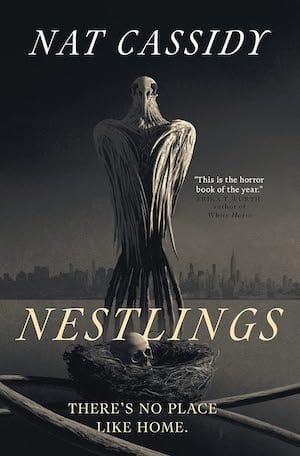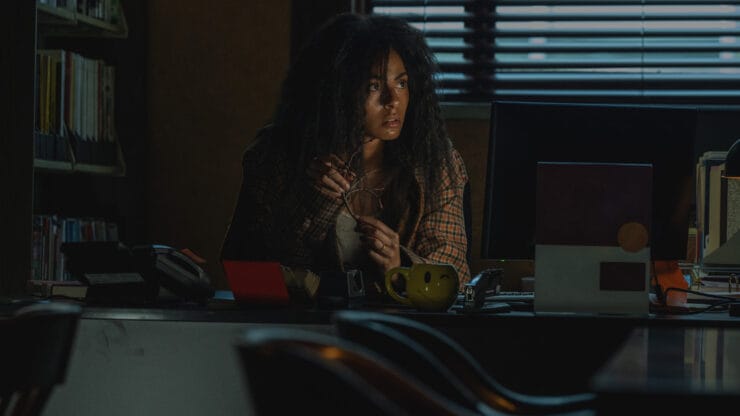“Aftermath. After. Math. Noun. Definition: the consequences or after effects of a significant, unpleasant event.” The sixth episode of The Changeling opens with those words. It is the theme of this week’s hour. It begins in the aftermath of Emma’s sorcery-induced attack on baby Brian and ends with her staring down whatever is coming next.
As with the previous episode, much of the content in episode six was invented for the show. Author Victor LaValle gives us the highlights of these events—Emma living on North Brother Island, stealing books for their library, hunting for answers about the real baby Brian, setting off on her quest to save him—and showrunner Kelly Marcel flushes those bullet points out into vivid detail.
Emma begins this episode fleeing from her apartment. Her sister tosses her overboard to send her to Cal. Fairy tales and folktales are full of stories of heroes falling into, wading into, or crossing bodies of water. If we think back to all the Greek mythology references, this scene reminded me of the Rivers Archeron, Lethe, and Styx that separated the world of the living from the underworld of the dead. Archeron was the river of pain across which Charon ferried the dead. Spirits drank the goddess Lethe’s waters to erase their memories of being alive, while Styx was a goddess so fearsome that it was to her that other gods made their oaths to ensure their promises were unbreakable. By swimming in the East River, she literally leaves her mortal life behind. Two women play the role of Charon, ferrying the being once known as Apollo’s wife and Brian’s mother to a land of people the rest of the world thinks are dead or disappeared. She almost succumbs to oblivion during her second crossing, but pulls herself out by remembering her love for Brian and Apollo.
The little green light on the rowboat makes me think of The Great Gatsby. In F. Scott Fitzgerald’s famous novel about a bunch of obnoxious rich white people in 1920s New York City uses the green light as a symbolism for the American dream being just out of reach as well as Jay Gatsby’s desperate love for Daisy. We see that same bright green again in the forest on the island and the leaf drawing Emma uses to track down her son. Apollo and Emma reached for the American Dream. They had a family and good jobs. If he’d been able to sell the book, they might have been able to afford a down payment on a starter home. Everything was going according to plan. Until that dream was snatched away. Emma’s desperate love is the only thing keeping her going. It is the magic that drives her.
Emma’s arrival on the island plays in sharp contrast to Apollo’s. He came demanding revenge for his wife’s brutality and instead found a safe haven for vulnerable people. Emma came in search of her son and instead found a ruined island of frightened women whose children are lost for good. They all believed they could save their babies, and they all failed. It’s no wonder they have no hope that Emma will be able to achieve what they could not. But as Cal and Apollo learn, Emma is no ordinary mortal woman, not anymore. Perhaps she never was. Perhaps this story was always really about a sorceress and a god.
I loved the way the scenes of Emma wandering around Cal’s island mirrored those of her explorations of the Brazilian ruins. Even her clothes on the island echo back to Brazil. There, she wore nothing but a thin, long white dress and her hair in long braids. Here, she wears a filthy white shirt and white overalls stained with Apollo’s blood, her long hair gone frizzy and tangled, and a dark cloak signaling her turn to witchery and the blend of darkness and light in her soul.
Both of those moments were crossroads in her life. She made choices and personal discoveries that would alter her life forever. She is exactly where she needs to be. These scenes also call back to those of her mother, no matter how much Emma doesn’t want to be like her. Unlike the paralleled Brazil scenes, Emma’s experiences are a backwards mirror version of those with her mother. Her mother was trying to protect her daughters in her own twisted way, however killing them was an act of fear, not love. Emma has her own moment of fear on the ferry with her sister, but she can’t turn back now. She started down this path and she must see it through.
We also get a parallel between Apollo and Emma’s imprisonment. Cal locks Apollo up as a threat and to remind him who really has the power here. If you asked Cal, she’d say she drugged Emma to help her, but if you asked Emma, she’d call it a betrayal. Cal treated her no better than what the outside world would’ve done to her. “Are you gonna scream and make a scene?” taunts Cal. She’s treated like a hysterical woman who needs to be controlled with medication and who cannot be trusted to make her own decisions. The dynamics of a white woman taking away a Black woman’s agency isn’t lost on me, either. Cal’s good intentions are meaningless in the face of the devastating impact they have on Emma. It’s telling that the only person to make a real connection with Emma is a Black woman.
Buy the Book


Nestlings
Back in New York, Emma takes yet another trip to the underworld, this time literally instead of metaphorically. She passes through whole communities of people who fled the world above. “‘Out of sight, out of mind’ suits us just fine,” says Wheels, her guide. Their children weren’t stolen from them, but they do carry trauma. The communities have the feel of a goblin market from a fairy tale. They’re full of unusual people and strange sights. It reminds me a bit of the Floating Market and London Below from Neil Gaiman’s book Neverwhere as well. The 1996 TV miniseries adaptation portrayed was just as kooky and quirky.
Emma’s path intersects twice with Apollo’s in this episode: first when she sees a news report about Apollo surviving, second when she hides from Apollo in the library stairwell. When we saw this scene earlier, we could see how his grief and rage drove him to take the librarians hostage. (He was apparently never told that Emma was seen at the scene, either.) All Emma sees is a violent man waving a gun around and threatening innocent people. This is echoed later when Apollo storms the island. As much as she still loves him, she understands he’s still not in a place to help her in her quest.
“The Norway maple, an invasive species. The aggressive roots girdle even the parent tree, choking itself to death. It creates a canopy of dense shade, preventing the regeneration of other seedlings and wildflowers. It is a sneaky bastard tree.” It’s Wheels who points her in the direction of Little Norway. Now, I know hardly anything about New York City history, but from what I can tell from some cursory research, Little Norway was in the Red Hook and Bay Ridge areas of Brooklyn. The show, however, places it in the Forest Hills neighborhood in Queens. Maybe someone who knows New York City history can explain in the comments what I’m missing. Regardless, the history of Norwegian immigrants in New York City, what little of it I read, is very interesting; it apparently goes all the way back to New Amsterdam.
The final scene is Emma bidding farewell to Cal and North Brother Island. There is nothing left for her there. She leaves with Cal a copy of Apollo’s fairy tale book to give to Brian in case she doesn’t survive. “Brian is in the forest,” Emma says. Cal makes the same dismissive face Apollo did when he didn’t believe her about there being something wrong with the baby. But seeing Emma glow blue changes Cal’s mind. Emma might be able to do what none of the other mothers could: get her child back alive.
Two more episodes to go. Presumably we’ll see what comes from Apollo and William’s incursion onto the island next week, but who really knows. We’re way off the page now and into brand new territory. I know the destination, but I’ll just have to trust Marcel to guide me down this unknown path.
Alex Brown is a Hugo-nominated and Ignyte award-winning critic who writes about speculative fiction, librarianship, and Black history. Find them on twitter (@QueenOfRats), bluesky (@bookjockeyalex), instagram (@bookjockeyalex), and their blog (bookjockeyalex.com).










